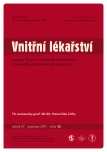Does rational therapy exist in patients with Crohn’s disease and ulcerative colitis?
Authors:
M. Lukáš 1,2
Authors‘ workplace:
Klinické a výzkumné centrum pro střevní záněty ISCARE Lighthouse a 1. lékařská fakulta UK Praha, přednosta prof. MUDr. Milan Lukáš, CSc.
1; Ústav klinické biochemie a laboratorní diagnostiky 1. lékařské fakulty UK a VFN Praha, přednosta prof. MUDr. Tomáš Zima, DrSc., MBA
2
Published in:
Vnitř Lék 2011; 57(12): 1029-1033
Category:
70th birthday of prof. MUDr. Petr Dítě, DrSc.
Overview
Crohn’s disease and ulcerative colitis belong to an autoimmune mediated, civilizing diseases having a rise of incidence. The cause of both disease is still unknown with undoubted importance of diet, a lifestyle and using of antimicrobial drugs in the last fifty years. The rational therapy is based to use the drugs with high anti-inflammatory efficacy. The choice of therapy is driven due to disease course in individual patient. The integral part of patients follow up are activities directing to minimize of drug’s side effects.
Key words:
Crohn’s disease – ulcerative colitis – aminosalicylates – glucocorticosteroids – immunosuppresants – biologic therapy
Sources
1. Lukáš M, Bortlík M. Etiologie a patogeneze ulcerózní kolitidy. Stále více otazníků než jasných odpovědí. Gastroent a hepatol 2011; 65 : 56–64.
2. Lukáš M, Ďuricová D, Bortlík M. Doporučení pro podávání biologické terapie u idiopatických střevních zánětů. Čes a Slov Gastroent a Hepatol 2008; 62 : 285–291.
3. Hoentjen F, Sakuraba A, Hanauer S. Update on the Management of Ulcerative Colitis. Curr Gastroenterol Rep 2011; 13 : 475–485.
4. Manza M, Michetti P, Seibold F et al. Treatment algorithm for moderate to severe ulcerative colitis. Swiss Med Wkly 2011; 141: w13235. doi: 10.4414/smw.2011.13235.
5. Lichtiger S, Present DH, Kornbluth A et al. Cyclosporine in severe ulcerative colitis refractory to steroid therapy. N Engl J Med 1994; 330 : 1841–1845.
6. Van Assche G, D’Haens G, Noman M et al. Randomized, double-blind comparison of 4 mg/kg versus 2 mg/kg intravenous cyclosporine in severe ulcerative colitis. Gastroenterology 2003; 125 : 1025–1031.
7. Travis SP, Stange EF, Léman M et al. European Crohn’s and Colitis Organisation (ECCO). European evidence-based Consensus on the management of ulcerative colitis: Current management. J Crohns Colitis 2008; 2 : 24–62.
8. Huang X, Lv B, Jin H et al. A meta-analysis of the therapeutic effects of tumor necrosis factor-α blockers on ulcerative colitis. Eur J Clin Pharmacol 2011; 67 : 759–766.
9. Oussalah A, Evesque L, Laharie D et al. A Multicenter Experience With Infliximab for Ulcerative Colitis: Outcomes and Predictors of Response, Optimization, Colectomy, and Hospitalization. Am J Gastroenterol 2010; 105 : 2617–2625.
10. Carter CT, Leher H, Smith P. Impact of persistence with Infliximab on hospitalizations in ulcerative colitis. Am J Manag Care 2011; 17 : 385–392.
Labels
Diabetology Endocrinology Internal medicineArticle was published in
Internal Medicine

2011 Issue 12
-
All articles in this issue
- Do we need endoscopic sclerotherapy of oesophageal varices or the last turn off the light
- Epidemiology of Helicobacter pylori infection
- Screening of celiac disease in patients with osteoporosis and osteopenia
- The expected worldvide burden of oesophagus, stomach and colorectal cancers
- Aldosterone as an endogenous cardiovascular toxin and the options for its therapeutic management
- Neuroendocrine tumours of the upper gastrointestinal tract, characteristics and comparison of localization diagnostics
- Keratin fragments as a serological indicator in patients with a liver disease
- Does rational therapy exist in patients with Crohn’s disease and ulcerative colitis?
- Ablative treatment of rectosigmoideal praecanceroses and early cancer
- Survival of patients after TIPS in the University Hospital Hradec Kralove
- The coincidence of alcoholic liver cirrhosis and chronic pancreatitis
- Complications of endoscopic retrograde cholangiopancreatography and how to minimize them
- Inadequate screening and low awareness about risk factors among first-degree relatives of colorectal cancer patients
- Internal Medicine
- Journal archive
- Current issue
- Online only
- About the journal
Most read in this issue
- Neuroendocrine tumours of the upper gastrointestinal tract, characteristics and comparison of localization diagnostics
- Complications of endoscopic retrograde cholangiopancreatography and how to minimize them
- Aldosterone as an endogenous cardiovascular toxin and the options for its therapeutic management
- Do we need endoscopic sclerotherapy of oesophageal varices or the last turn off the light
